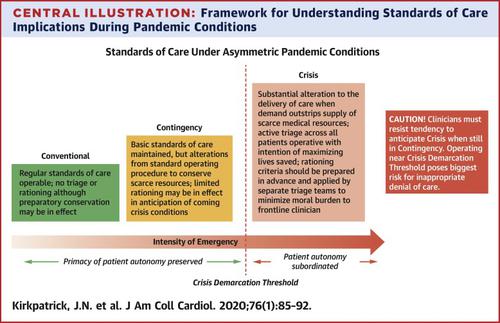当前位置:
X-MOL 学术
›
J. Am. Coll. Cardiol.
›
论文详情
Our official English website, www.x-mol.net, welcomes your
feedback! (Note: you will need to create a separate account there.)
Allocating Scarce Resources and Triaging Patients during the COVID-19 Pandemic
Journal of the American College of Cardiology ( IF 21.7 ) Pub Date : 2020-07-01 , DOI: 10.1016/j.jacc.2020.05.006 James N Kirkpatrick 1 , Sarah C Hull 2 , Savitri Fedson 3 , Brendan Mullen 4 , Sarah J Goodlin 5
Journal of the American College of Cardiology ( IF 21.7 ) Pub Date : 2020-07-01 , DOI: 10.1016/j.jacc.2020.05.006 James N Kirkpatrick 1 , Sarah C Hull 2 , Savitri Fedson 3 , Brendan Mullen 4 , Sarah J Goodlin 5
Affiliation

|
Abstract The COVID-19 pandemic and its sequelae have created scenarios of scarce medical resources, leading to the prospect that healthcare systems have faced or will face difficult decisions about triage, allocation and reallocation. These decisions should be guided by ethical principles and values, should not be made before crisis standards have been declared by authorities, and, in most cases, will not be made by bedside clinicians. Do not attempt resuscitation (DNAR) and withholding and withdrawing decisions should be made according to standard determination of medical appropriateness and futility, but there are unique considerations during a pandemic. Transparent and clear communication is crucial, coupled with dedication to provide the best possible care to patients, including palliative care. As medical knowledge about COVID-19 grows, more will be known about prognostic factors that can guide these difficult decisions.
中文翻译:

在 COVID-19 大流行期间分配稀缺资源和对患者进行分类
摘要 COVID-19 大流行及其后遗症造成了医疗资源稀缺的情况,导致医疗保健系统面临或将面临关于分类、分配和重新分配的艰难决定的前景。这些决定应以伦理原则和价值观为指导,不应在当局宣布危机标准之前做出,并且在大多数情况下,不会由床边临床医生做出。不要尝试复苏 (DNAR),应根据医疗适当性和无效性的标准确定来做出暂停和撤回决定,但在大流行期间存在独特的考虑因素。透明和清晰的沟通至关重要,再加上致力于为患者提供最好的护理,包括姑息治疗。随着有关 COVID-19 的医学知识的增长,
更新日期:2020-07-01
中文翻译:

在 COVID-19 大流行期间分配稀缺资源和对患者进行分类
摘要 COVID-19 大流行及其后遗症造成了医疗资源稀缺的情况,导致医疗保健系统面临或将面临关于分类、分配和重新分配的艰难决定的前景。这些决定应以伦理原则和价值观为指导,不应在当局宣布危机标准之前做出,并且在大多数情况下,不会由床边临床医生做出。不要尝试复苏 (DNAR),应根据医疗适当性和无效性的标准确定来做出暂停和撤回决定,但在大流行期间存在独特的考虑因素。透明和清晰的沟通至关重要,再加上致力于为患者提供最好的护理,包括姑息治疗。随着有关 COVID-19 的医学知识的增长,











































 京公网安备 11010802027423号
京公网安备 11010802027423号